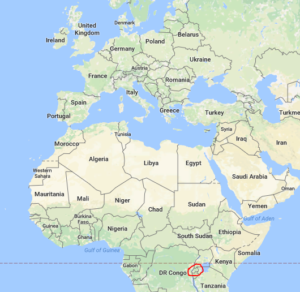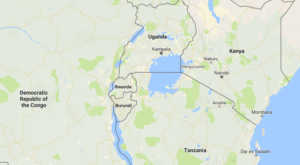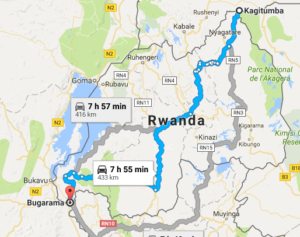Before I flew out, there were some pretty fundamental things about Rwandan every day life that I was unaware of. Things like what language is spoken, what food is eaten and what is the local currency.
Now that I have at least a bit of sense of how things work I thought I’d write them up in case you ever find yourself on a flight out to the country and need to get up to speed.
Here are some of the basics:
Size
It’s pretty small and lies just to the south of the equator.
See, it’s here:

To the North East is a lake (Lake Victoria) and if you could cut out Rwanda and then air lifted it 500 km you could drop the whole country into this body of water and still have room to swim.

It’s difficult to compare like for like in terms of transit, but Google reckons it would take just under 8 hours to drive from tip to tip. There’s apparently a short cut through Burundi, but it’s probably best to be 15 minutes late than risk it as things there are a bit iffy.

Compared to Europe, it is roughly the size of Belgium.
In UK-centric terms Rwanda is a probably most similar to Wales
Hills
Whilst Wales is famed for valleys, Rwanda has hills. In fact, it is known as “The Land of a Thousand Hills”.
It’s remarkable that so much stuff is able to happen here, as the inclines are steeper than I imagined. Driving out into the country you see farmers sowing seeds way up in the horizon, and in Kigali (capital city) there’s rarely a flat patch.
Sport
If you think about it, most sports happen on a level playing field.
Ones where you can get away with deep undulation or full-on slopes are:
- skiing
- snowboarding
- cycling
- zorbing
and so far here, I’ve only seen cycling.
In fact, Rwanda are sending a cyclist to the Rio Olympics.
Other sports are do happen, though lack a flat bit of grass where you can kick/ throw/ bounce a ball mean that it’s probably harder than in other areas of the planet.
Weather
It’s hot, but not too hot. So far I’ve walked around in trousers.
What’s quite nice is that it’s also all quite predictable.
Rather than dividing up the year into four roughly equal segments of Spring, Summer, Autumn and Winter, the seasons here are split between two wet and two dry.
Writing this in August means I’m part of the “long dry season”. It goes like so:
Dec – Feb: Dry
Mar – May: Wet
June – Sep: Dry
Nov – Dec: Wet
I’ve not thought far enough ahead to think what’ll happen once it gets cloudy, so for now will set back and enjoy the sunsets.
Money
This has been easy to compute.
The local currency is a Rwandan Franc which is pretty much RwF 1000 = £1.
In general things are cheaper, but not ridiculously so.
Language
It’s English really.
The local language is kinyarwanda which is nice to use but effort to learn. Apparently it’s in the same league as learning Chinese and so I’ll be sticking to the few stock phrases I’ve been learning.
About eight years ago the government decided “nous terminons” with French and the country switched to English which is mighty helpful for anglophones like me.
Food
As I’ve so far just been in the city I feel my experience of this might be quite unrepresentative.
Nevertheless from what is available in restaurants and supermarkets it seems that the local diet is centred on rice, beans and potatoes.
My white carb intake has increased about tenfold
A popular lunch time option is to go for an all-you-can-eat buffet of local food which comes to ~£3.50 is v tasty.
In other news a massive avocado is 25p.
Politics
This is invariably tough to summarise in a short paragraph.
The best way I can describe is that the Rwandan President (Paul Kagame) is looking to follow the Singaporean model of growth which saw the country rise from subsistence agriculture to a highly-developed industrial economy based on state-backed support of private industry, foreign investment and general discipline throughout the population.
He’s been in power for sixteen years and the economy has dramatically improved relative to neighbouring countries. Almost everyone comments on its lack of corruption.
Conclusion
This more or less sums up the basics that I’ve got covered in the short time I’ve spent here.
Soon there will be a post about some of the interesting observations I’ve been jotting down, but I’ll leave it here for now.